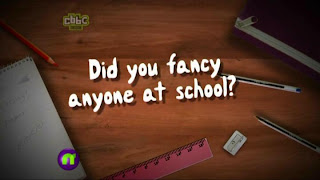Kirsten O'Brien once suggested that lots of the people working for CBBC are gay. It's actually quite a common stereotype. In a sketch from Little Britain, Daffyd tells his mum there's loads of jobs he'd like to do - hairdresser, airline steward, children's TV presenter - but he'll never get a job because, as he puts it, they simply don't employ the gays.
But if there really are so many 'gays' working for CBBC, why doesn't the channel have a good diversity record? Instead it avoids LGB characters in kids' dramas, and is unable to cope with the sexuality of stars like Joe McElderry.
In contrast, heterosexual representation is no problem for CBBC. Leah, for example, is unable to keep her sexuality to herself in this clip. You'll see Leah make no secret of her attraction to Zac Efron. Does anyone seriously believe that, if she had lesbian proclivities, Newsround would be happy to broadcast a similar show of affection for a female celebrity?
Apparently Leah also quite likes teenage superstar Justin Bieber. So much so that the programme she presented on 8th November captioned Justin as a "mega hunk" when he was featured following his success at the MTV Music Awards:-

Leah: ... the mega hunk did well last night, beating Kanye West to win Best Male.
You'd think a famous writer would have insight into the world around him and into humanity. But when Anthony Horowitz answered questions in Newsround's When I Was 10 spot he simply demonstrated rather narrow-minded thinking. In answer to:-

Anthony Horowitz: Erm .. it was an all-boys school.
Even though there are thousands of LGBT people in showbiz, the industry as a whole has a history of discrimination.
Eight years ago, at a time when CBBC was inclusive, Newsround reported Declan Donnelly's concerns that show bosses were treating Pop Idol winner Will Young, who had recently come out as gay, worse than runner-up Gareth Gates.
It looks like a similar cause for concern exists now, with winner Joe McElderry attracting less media attention than the X Factor runner-up, Olly Murs. The difference, these days, is that no-one now seems willing to speak out against prejudice. It is also the case that some of the X Factor and Strictly Come Dancing outcomes are likely to have been the result of racism rather than intrinsic artistic merit.
Take a look at this sketch from Hedz in TMi Friday. It seems that Cheryl Cole isn't very pleased to have Joe McElderry as a replacement date. Cheryl ends the sketch with "Just my luck." Although I can think of an innocent explanation, given that CBBC has form in regard to anti-LGBT discrimination many young viewers will assume that Cheryl's reaction is a result of Joe's sexual orientation.
Similar Joe McElderry/Cheryl Cole sketches culminating with the "Just my luck" exclamation have been screened in more recent episodes of TMi.

Why would CBBC, with many LGBT people working for them, make homophobic jokes and resolutely refuse to deal with homophobic bullying? Any suggestions?
